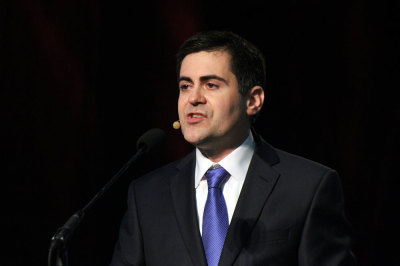What Should the Church Say to Bruce Jenner?
In the 1970s Bruce Jenner seemed to have it all—fame, wealth, admiration. He was an Olympic star, so popular in American culture that he was reputedly considered for both the roles of Superman and James Bond. That's changed. Now, Jenner is best known as the step-father on reality television's Keeping Up with the Kardashians. Jenner is now ready for one more change. He says he knows what he's been missing: his identity as a woman.

Jenner has reportedly undergone surgery to make himself appear more like a woman and has been photographed wearing dresses. Now, in a highly publicized interview with Diane Sawyer, he says that his "whole life has been leading up to this."
Bruce Jenner, of course, is a symbol, a celebrity spokesperson for an entire mentality that sees gender as separate from biological identity. So is there a word from God to the transgender community? How should the church address the Bruce Jenner in your neighborhood, who doesn't have the star power or the Malibu mansions but who has the same alienation of self?
First of all, we should avoid the temptation to laugh at these suffering souls. We do not see our transgendered neighbors as freaks to be despised. They feel alienated from their identities as men or women and are seeking a solution to that in self-display or in surgery or in pumping their bodies with the other sex's hormones. In a fallen universe, all of us are alienated, in some way, from who we were designed to be. That alienation manifests itself in different ways in different people.
But neither should we fall for the cultural narrative behind the transgender turn. This narrative is rooted in the ancient heresy of Gnosticism, with the idea that the "real" self is separate from who one is as an embodied, material being. Body parts and chromosomal patterns are dispensable since the self is radically disconnected from the body, the psychic from the material.
The old Gnostic heresy is joined with contemporary expressive individualism—the idea that I must be true to whomever I perceive my "real me" to be on the inside in order to be "authentic." This is what leads, in other news of the week, some parents to "transition" the gender identity of their child at ages as early as four years old.
It is somewhat ironic that Jenner's interview comes in the same week as Earth Day. Earth Day, of course, reminds us that human desires and human technologies ought to have limits. Just because a corporation has the technological power to raze a forest or level a mountain or to dump toxins into a water system is no sign that one should do so. The common good means human beings learning to live in balance and harmony with nature, not with a rapacious domination of it.
What is true of natural ecology is true of human ecology as well. Techno-utopian scientism tells us that we can transcend our limits, to become as gods. For some, that manifests itself in believing that humanity can pollute its own ecosystem with impunity. For others it manifests itself in believing that they can transcend the boundaries of the male/female polarity. A biblical view of our place in the universe is quite different. We are not machines, to be reprogrammed at will; we are creatures.
That vision includes a respect for God's natural, creative order that reflects His wisdom and Lordship over the world. Our maleness and femaleness is very much part of that wisdom and Lordship. We are born not out of self-effort but in the pure providence of our creator. Our given gender points us to an even deeper reality—to the unity and complementarity of Christ and the church. A rejection of the goodness of those creational realities then is a revolt against God's lordship, and against the picture of the gospel that God has embedded in the creation.
The hope for Bruce Jenner, and for others like him, is not to alter the body with surgery or to flood their systems with hormones. The answer is to realize that all of us are born alienated from what we were created to be. We don't need to fix what happened in our first birth; we need a new birth altogether.
For the church, this is going to mean both conviction and wisdom. Our transgender neighbors experience real suffering, and we should suffer with them. The answers the culture and the Sexual Revolution-Industrial Complex offer can't relieve that suffering. We should stand for God's good design, including around what Jesus says has been true "from the beginning"—that we are created male and female, not as self-willed designations but as part of God's creative act (Mk. 10:6).
In so doing, what every previous civilization would have seen as obvious, that maleness and femaleness are part of our biological design, will be seen as out-of-kilter with the culture. So be it. We will stand with conviction, even as we offer mercy. We've been called to keep in step with the Spirit, even if we can't always keep up with the Kardashians.
This article was originally published on Moore to the Point.





















